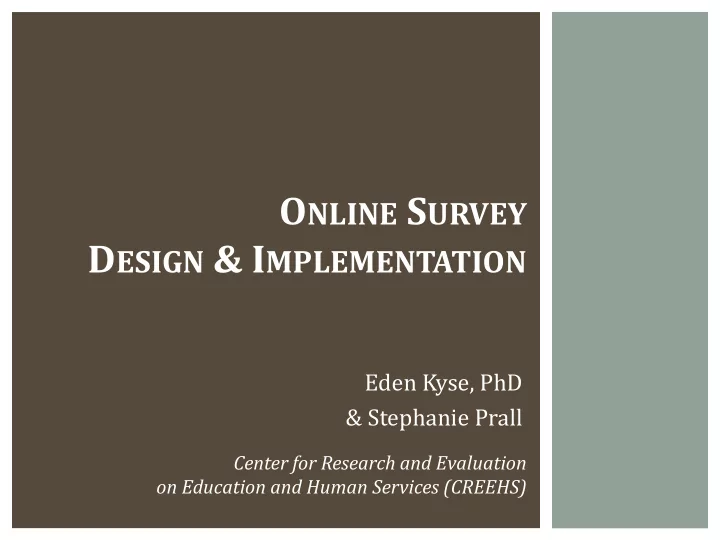

O NLINE S URVEY D ESIGN & I MPLEMENTATION Eden Kyse, PhD & Stephanie Prall Center for Research and Evaluation on Education and Human Services (CREEHS)
OVERVIEW 1. Online Surveys vs. Paper Surveys 2. Online Survey Design Guidelines 3. Maximizing Response Rates 4. Protecting & Respecting Participants 5. Selected Survey Provider Options
ONLINE SURVEYS vs. PAPER SURVEYS: ADVANTAGES Environmentally friendly Cost effective Speed & ease Distribution Response time Tracking Data entry & analysis Perception of anonymity Design options Data validation Automated skip logic Randomization of answer choices
ONLINE SURVEYS vs. PAPER SURVEYS: LIMITATIONS Sample demographics Computer access Computer literacy Technical issues Freezes, crashes Collection settings Design errors Privacy & data security
SURVEY DESIGN GUIDELINES 1. Make it Easy 1. Be Brief 1. Be Simple 1. Be Objective
1. MAKE IT EASY Welcome page with instructions Begin with an easy-to-answer question Question sequence Flow and pagination Sensitive items Navigation Show progress bar
SHOW PROGRESS (EXAMPLE)
2. BE BRIEF Avoid extraneous items Allow respondents to skip items Utilize automated skip logic
1. Does your child currently receive Special Education services? Yes ( If yes, please continue.) No (If no, please skip to Question 6.) I don’t know. (If I don’t know, please skip to Question 6.) 2. What grade was your child in when he or she began receiving Special Education services? ____________ 3. Which of the following services is your child currently receiving at his or her school? (Please check all that apply.) Speech Therapy Occupational Therapy Physical Therapy In-Class Support (such as, a teacher aide) Resource Room Counseling Services Other (please specify: __________) None 4. Does your child currently have an Individualized Education Plan (IEP)? Yes (If yes, please continue.) No (If no, please skip to Question 6.) I don’t know (If I don’t know, please skip to Question 6.) 5. How has your child’s school invited you to attend IEP meetings about your child? (Please check all that apply.) Letter sent by mail Paper sent home with your child Email Telephone Other (please specify: _______) I have not been invited to attend any IEP meetings. I don’t know.
3. BE SIMPLE Be concise and clear Consider your audience Avoid abbreviations, acronyms Avoid jargon, overly-sophisticated wording Validate text
BE CONCISE (EXAMPLE) Q. Do you believe that the parking situation on campus is problematic or difficult because of the lack of spaces or do you believe that the parking situation on campus is OK and that there are enough spaces for everyone to park? Yes No vs. Q. To what extent are you satisfied with the number of parking spaces on campus? Very satisfied Somewhat satisfied Somewhat unsatisfied Very unsatisfied I don’t know
VALIDATE TEXT (EXAMPLE) Q. How many adults currently live in your home (at least most of the time)? __________ 3 1 Two. 4 2.5 My father stays with us about 2 or 3 nights a week. I live alone. My son is 17. Too many!
4. BE OBJECTIVE Present balanced scales Avoid leading questions Randomize answer choices
RANDOMIZING ANSWER CHOICES (EXAMPLE) Q. Which of the following changes would you most like made in Montclair for bicyclists? (Check your top 2 priorities.) More dedicated bike trails (off streets) More bike lanes (on streets) Allow bikes on sidewalks Slower speed limits for motorists More bike racks Other (specify: ______________________) None. I don’t think any changes are needed.
QUESTION TYPES Question Types: Multiple Choice (one, multiple choices) Rating Scales Matrix (one, multiple choices, drop-downs) Open-ended Single text box Multiple text boxes Numeric or demographic text box Comment/essay box
REVIEWING & REVISING Review and evaluate clarity of instructions and items Pre-test Link Length (time) Skip logic Data collection Ask a friend or colleague (or 10!)
MAXIMIZING RESPONSE RATES Shorten, personalize link www.surveymonkey.com/s/F3GLOE34NVLS9JDIK4BGYQ3MT1HVGHS vs. www.surveymonkey.com/s/MSU_Survey Multiple contact strategy Emails/listservs, Postings to web pages, Print*, QR codes* Invitation clarity, timing, reminders Simple, clear, concise survey Incentives Multiple data collection strategy (supplementing online survey responses with mail/paper surveys, phone surveys, etc.)
PROTECTING & RESPECTING PARTICIPANTS: DATA SECURITY & IRB Provide information about: Purpose of survey/study How data will be stored and managed Allow respondents to skip items, withdraw Limit personal information collected Utilize data encryption option Be aware of IRB requirements (e.g., implied consent)
SELECTED ONLINE SURVEY PROVIDERS MSU’s own survey system (http://surveys.montclair.edu) Google Docs (http://www.google.com/google-d-s/forms/) SurveyMonkey (http://www.surveymonkey.com) zoomerang (http://www.zoomerang.com) QuestionPro (http://www.questionpro.com) SurveyGizmo (http://www.surveygizmo.com)
QUESTIONS? Email: kysee@mail.montclair.edu pralls1@mail.montclair.edu Center for Advanced Study on Education and Human Services (CREEHS): http://cehs.montclair.edu/academic/creehs/
Recommend
More recommend